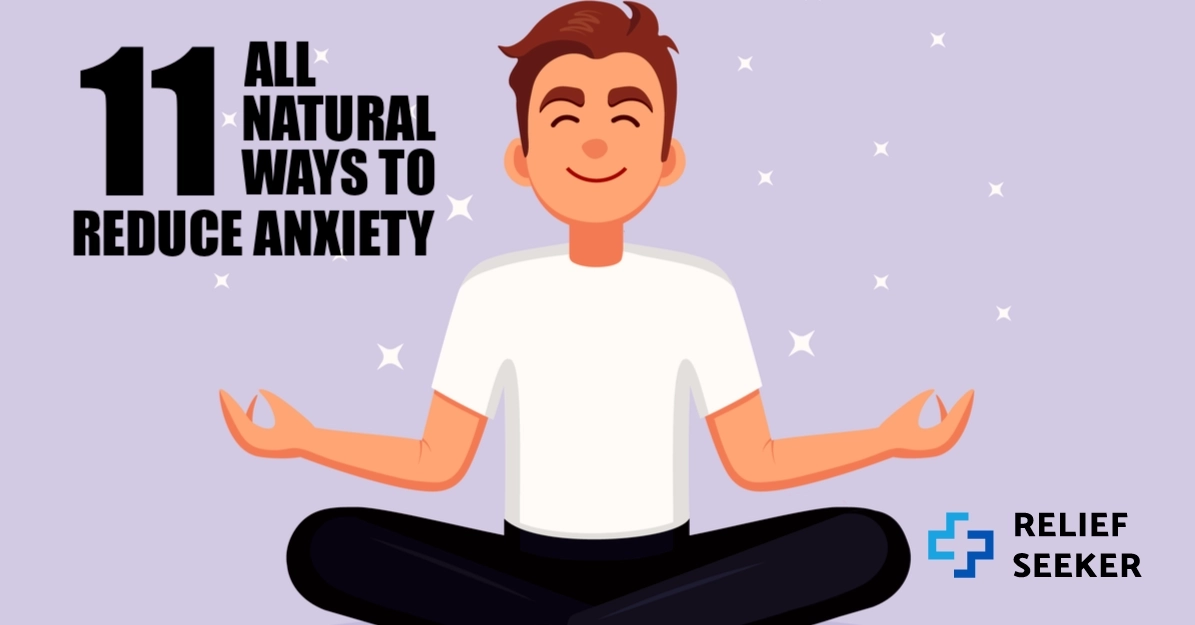Anxiety is caused by an imbalance in brain chemistry or the body’s overreaction to outside stressors.
Our bodies have sophisticated systems that help us react to dangerous situations (mostly those requiring us to flee really fast). Yet, it’s easy for the body to confuse a stressful meeting with a life-or-death situation. Too many stressors can lead to clinical anxiety.
Add the COVID-related stressors, and you’ve got a recipe for chronic anxiety and other panic disorders.
Many people opt for prescription medication to help balance the body’s hormones. But what if you’re not ready for anti-anxiety meds? If you want to know how to reduce anxiety naturally, we recommend trying some of these tried-and-true techniques for calming your nerves.
How to Reduce Anxiety Naturally: Try These 11 Tips
Talk Therapy
Talk therapy is hands-down one of the best natural remedies for anxiety. Sometimes our minds can create mountains out of molehills, and chatting about our problems can put things into perspective. Many excellent companies offer online talk therapy via messaging, voice, or video calls. See our list of the best online therapy companies to find the provider who's right for you.
Therapists can help you realize why you’re triggered by certain stressors while helping you work out your problems cognitively. In fact, cognitive-behavioral therapy (CBT) is considered the gold-standard in treating anxiety disorders.
Meditate
We all know that meditating is good for us, but can it really compete with anti-anxiety medications?
A 2013 study suggests that mindfulness meditation can help reduce anxiety. The good news is that you don’t need to become a monk to get the benefits of meditation, either. Most experts recommend meditating for only 5-to-10 minutes if you’re starting out.
Try downloading a meditation app if you need help getting started.
Meditation is a great way to promote mindfulness throughout your day, but did you also know that there are other ways to stay present, including mindfulness, belly breathing, and yoga?
Mindfulness
Mindfulness is known to reduce anxiety by forcing your mind into the present moment. If you’re not regretful over the past or fearful about the future, you’re more likely to reduce your anxiety.
If you hate meditating, you can try other mindfulness exercises, like keeping a gratitude journal, listening to a song you love (and giving it your full attention), or savoring your favorite food.
The idea is that you want to be 100% present with your present circumstances.
Belly Breathing
Most of us are walking around on this earth, breathing totally wrong!
When we’re born, we breathe deeply with our diaphragms into our bellies. Our bellies rise and fall with each breath (just watch a baby do it!), allowing our lungs to fully fill with air.
For some reason, many of us stop breathing this way and instead breathe from our chests. This results in shallow breathing that mimics how we would breathe if we were running for our lives.
By breathing properly, we can take deep breaths, and oxygen can more easily travel from our lungs and into our bloodstream — slowing down the heart rate and relaxing the mind.
Yoga
Yoga is great for your body and your mind! If you’ve ever tried yoga, you may have been in it to get limber and increase your muscle mass. Yet, this exercise can force your mind into the present moment (it’s hard to worry about your presentation when you’re twisted into a sun salutation!).
If you want to add some mindfulness techniques to your daily routine but are worried you’ll get bored in meditation, give yoga a try.
Exercise
Speaking of moving your body, regular exercise is another natural way to reduce anxiety. When we exercise, our bodies release chemicals called endorphins.
In the immortal words of Elle Woods, “Exercise gives you endorphins, and endorphins make you happy.”
Endorphins are natural pain relievers similar in structure to morphine (it’s what runners are searching for when they get the famous ‘runners high’).
Your body also releases dopamine, norepinephrine, and serotonin — three more feel-good hormones that combat generalized anxiety disorder.
If you’re feeling anxious, try going for a walk, hitting the gym, or riding your bike. These chemicals are why most problems seem more solve-able after you’ve worked out for an hour or so.
Get Enough Sleep
When it comes to anxiety, getting enough sleep is a bit of a catch-22. It would help if you had plenty of sleep each night to keep your anxiety levels down. But if you’re anxious, you probably won’t get a solid eight hours of sleep each night.
If you’re trying to find natural ways to reduce the symptoms of anxiety, you might want to invest in some accessories to make quality sleep a priority.
Hang blackout curtains, use a white-noise machine, and sleep underneath a weighted blanket to calm your nerves.
If you’re trying to reduce anxiety naturally, you may not want to opt for prescription sleep aids; yet, getting one good night’s sleep could help reduce your anxiety enough for the effect to snowball.
However, you decide to enhance your sleep routine, making sleep a priority can help reduce anxiety and enhance your mood.
Eat Nutritious Foods
Eating the right foods can help reduce your anxiety. Since hormonal imbalances are often caused by poor nutrition, you can actually help reduce your anxiety by eating the right foods.
Doctors and mental health experts recommend the following to help reduce anxiety:
- Drink caffeine-free tea (like a cup of chamomile tea)
- Avoid allergens
- Drink plenty of water
- Eat lots of leafy greens
- omega-3 fatty acids through supplements and fatty fish
Take Supplements
Sometimes it’s impossible to get all the nutrients we need through food alone. Supplements can help balance our deficiencies and keep our bodies healthy.
You’ll find supplements for just about any condition under the sun. There are even supplements for stress. Some of the most common vitamins and natural herbs to help combat anxiety include:
- Magnesium
- St. John’s wort
- GABA
- Ashwagandha
- Rhodiola
- Omega-3s
- Probiotics
Depending on the cause of your anxiety or other underlying health conditions, you might want to check with your doctor before starting a supplement regimen. You also might want to get checked for vitamin deficiencies with an at-home testing kit before adding more vitamins to your morning routine.
Limit Caffeine Intake
When it comes to your health, caffeine can be a double-edged sword. It can give us energy and clear our minds. Yet, too much caffeine can make us jittery and anxious.
Caffeine can actually stimulate your fight-or-flight response, making you feel as though you’re running from danger — not just enjoying your seventh cup of green tea.
If you drink more than one cup of caffeine each day, you might want to consider cutting back if you’re also suffering from an anxiety attack. Give the caffeine a break for a few weeks and see how you feel.
It takes about 10 hours for caffeine to leave your system, and you may experience caffeine withdrawals for up to nine days after your last dose. Your anxiety may worsen during this time period, so waiting until the withdrawals are gone to assess your symptoms may be necessary.
Limit Alcohol and Cannabis
Both alcohol and cannabis are stimulants and can trigger anxiety and even panic attacks.
For most people, one glass of wine or just a little bit of cannabis may make your jitters disappear. But if you partake in either too often, you could end up depleting your serotonin.
If you live in a state where cannabis is legal, you may want to talk to your doctor about using medical marijuana to treat your anxiety. However, you want to keep an eye out for adverse side effects and let your doctor know if the cannabis helps your anxiety — or worsening it.
Don’t Smoke
Another stimulant you might want to avoid if you’re trying to figure out how to reduce anxiety naturally is nicotine.
Nicotine has been known to increase anxiety over time. While smoking one cigarette may calm your nerves (and feel good while you’re puffing), a build-up of nicotine in your bloodstream can lead to higher levels of anxiety over time.
Try CBD
While it’s still too early to determine if CBD pills and CBD topical treatments have long-term effects on anxiety, there’s a decent amount of anecdotal evidence that suggests it can help to decrease chronic anxiety as well as promote restful sleep.
Short for cannabidiol, CBD is the component in cannabis that may offer some health benefits. It’s been known to ease anxiety, prevent seizures, and reduce insomnia. CBD doesn’t need to contain THC (the psychoactive chemical in cannabis).
The national legal level of THC in CBD products in the U.S. is .03%.
Just as with any of the tips on this list, we recommend checking with your doctor before taking CBD to ensure it’s the right course of treatment for you.
Relax Your Senses
The cure for anxiety is relaxation. But how do we achieve optimal states of relaxation? Besides meditation, deep breathing, and mindfulness, we can engage our senses to help us relax.
Some of our favorite relaxation techniques to increase well-being include:
- Listening to calming music
- Trying aromatherapy (using essential oils like lavender oil)
- Getting a massage
- Trying acupuncture
- Spending time with loved ones
While not all of these techniques will work for every patient, trying a combination of the above anti-anxiety tips has been known to help reduce anxiety in many patients. For anyone that wants to find out how to reduce anxiety naturally, we recommend trying the above lifestyle changes in conjunction with talk therapy.


